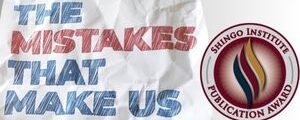This post is material cut from earlier drafts of my book, The Mistakes That Make Us: Cultivating a Culture of Learning and Innovation.
Shifting to the stage, Merit Kahn is a sales expert and standup comedian. Even the most famous comedians have stories of a night when they failed — comics say they “bombed.” You might think it’s a comic’s job to know, but a comedian doesn’t know a joke is funny — or that every joke will work with every audience. They’re more likely to be correct in their hypothesis that something is funny.
Like other comics, Merit has a process for testing jokes or “sets” of jokes with audiences. Their testing sounds like a Plan-Do-Study-Adjust (PDSA) process — because they expect to make mistakes.
Merit explains,
“The reason comics go to open mic nights to test new material is that there’s a big difference between me writing something in my comedy journal that I think is funny and then getting the words right and seeing how the audience reacts.”
She draws parallels to the process of testing sales collateral that a business would use, saying, “You can’t just test a joke one time.” Sometimes, the concept of a joke is good, but the delivery is wrong. “Sometimes, it’s the room,” meaning that the comedian didn’t make a mistake but still didn’t get laughs. With a sales brochure or pitch, sometimes the offer isn’t appropriate for that business at that time. We expect to make mistakes, but not every failure is caused by a mistake.
As Merit learned,
“There are so many factors [with a joke or a proposal], and we have to learn to isolate what the real root of the issue is so that we don’t duplicate those mistakes and we can learn from those experiences.”
I’m assuming (I don’t know) that Merit hasn’t spent time with former Toyota people, but they use that same language around finding the “root cause” of a problem or a mistake. You’ll hear more stories about that Toyota culture later in the book.
“As long as the world is turning and spinning, we’re gonna be dizzy and we’re gonna make mistakes.” – Mel Brooks, American comedian and filmmaker
Merit also describes how improvisational comedy, or improv, is built upon specific rules. Following those rules, improv performers should have a “pretty good outcome.” Improv students might make planning mistakes rooted in not knowing all the rules or they might “slip” by not following one of the rules they know. Then again, one of the core rules of improv is “there are no mistakes.”
Professional singer and recording artist Yaya Diamond shared thoughts on the risk of making mistakes on stage with a band. “You’re never going to prevent musical mistakes completely. You’re going to hit flat notes and sometimes, in the middle of a song, I forget the words.” You’ll make mistakes, no matter how much you rehearse, especially when you’re out of your normal routines or something unusual happens in the venue.
Sometimes, “You make up your own words because nobody really knows the words anyway.” Life goes on.
“Always there should be a little mistake here and there – I am for it. The people who don’t do mistakes are cold like ice. It takes risk to make a mistake. If you don’t take risk, you are boring.” — Vladimir Horowitz, classical pianist (1903 – 1989)
Magician Fred Moore has to prepare for the mistake of bringing the wrong person up on stage to be part of his act. Fred has learned not to choose people who seem too enthusiastic because they tend to want attention too badly. He corrected a mistake a few times by firing someone in the middle of his routine, finding a replacement from the audience. Fred has learned he sometimes needs to keep going, since the “unknown elements keep the show spontaneous and keep it fresh for me.”
When Fred started streaming Facebook Live videos, he did them twice a week “because I could fail, and fail fast. I could learn what all the mistakes were and what to do to fix them.” When he makes huge mistakes, such as his microphone not working for ten minutes, he can delete the video, and “it’s fine.” He didn’t use the language, but that sounds like Plan, Do, Study, Adjust cycles at work.



